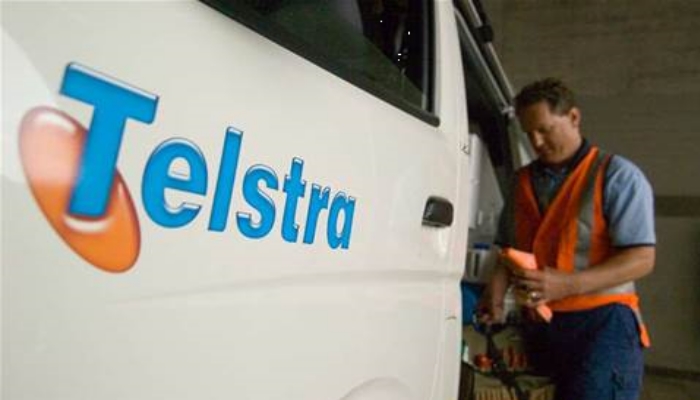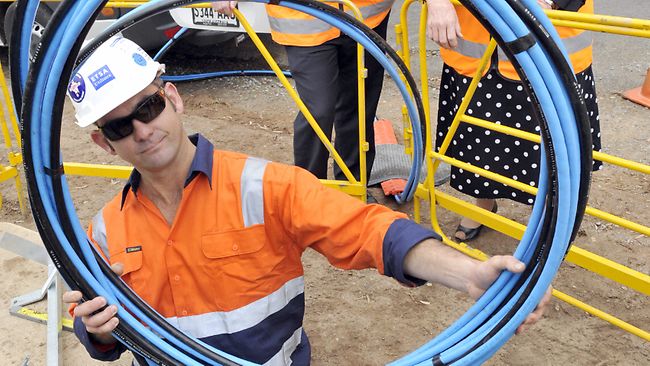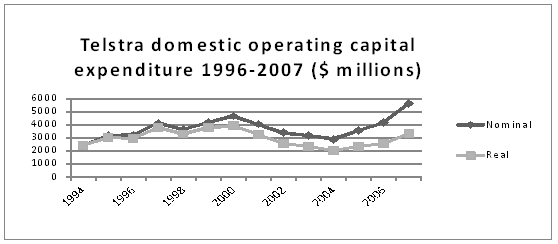
Telco e-Bulletin 2013 - #18
- CWU meets with Telstra on Operations job cuts.
- Membership alert: Operating Model Review implementation.
- Operations health and safety elections: know your rights.
- CWU successfully defends compensation entitlements.
- More Optus jobs go off-shore.
- Ziggy Switkowski confirmed as NBN Co head.
- NBN roll-out: steady as she goes – for now.
- NBN review must look at work quality, training says CWU.
- Asbestos taskforce to appoint monitors.
- Coalition to relax sham contracting rules.
- Smartphones: the new slave drivers?
1. CWU meets with Telstra on Operations job cuts
The CWU has now met twice with Telstra as part of the formal consultation about the proposed job cuts arising from the Operating Model Review (OMR) in Operations.
Of the 1100 job losses projected in Telstra’s 25 September announcement, only 360 have been identified and discussed to date, 92 of which involve agency staff. The majority of the cuts are in Customer Service Delivery but have not, at this stage, involved Communication Technicians (CTs).
Other job losses are slated for Media and Network Delivery.

On the issue of contractors, the CWU has sought assurances from Telstra that employees won’t be made redundant in areas where contractors are still being used to do the same or similar work.
Telstra says it is winding back and/or reviewing its use of contractors in many areas. However the CWU was able to point to examples of contractors being retained even when internal staff were being targeted for redundancy. For instance we have had reports of this being the case in the wideband design area.
At the most recent meeting with Telstra (Tuesday 1 October) Telstra undertook to examine the particular cases that we cited.
The CWU is also concerned that staff who could in future be needed to do NBN-related work will be made redundant. For instance Telstra is proposing to cut over 80 wideband design positions. This is short-sighted, especially given overall industry skill shortages in the design area.
Telstra has given no definite indication as to when details of the rest of the cuts will be announced but it appears likely that there will be more information during this month.
Members will be kept informed of any further developments in this consultation period.
In the meantime, members aware of instances of contractors being used in areas where redundancies are to take place should inform their state branch immediately.
2. Membership alert: Operating Model Review implementation
The CWU has received a number of reports and queries from members about the impacts of the Operating Model Review (OMR) proposals.
Members should be aware of the following:
- At this point we are still in the consultation phase of the proposal. No actual changes to positions should be occurring, no SWAGs being set in motion etc. Members should immediately report any moves by management to implement the OMR proposals to their state branch.
- If the current proposals are implemented, there should still be no group selection processes undertaken until expressions of interest in the new positions created in this reorganisation have been called for. It is expected that appointments to the new roles will occur before any final notice of redundancies is given.
- In cases where employees are simply being transferred from one work area to another there should be no change to their existing classifications and conditions.
- Where new roles – or what Telstra defines as new roles – have been created there may be argument over classification structures (Workstream or Job Family) and levels. All such cases should be reported to the union.
Members should alert their state branches to any management activity that is contrary to these understandings.
In particular any statements that a job offer is dependent on moving to the Job Family model should be reported immediately.
3. Operations health and safety elections: know your rights
The CWU has received information from members suggesting that Telstra intends to hold fresh health and safety elections in some of the areas affected by the Operations reorganisation.
It is important that CWU members understand their rights and the role of the union in this process- both in forming health and safety work groups and in holding elections for Health and Safety Representatives (HSRs).
Under the current Work Health and Safety Act the CWU can be involved in both these processes – but only if members actively exercise their legal rights.
Forming work groups.
You have a right to have your union involved in establishing work groups.
Section 52 of the legislation requires Telstra to negotiate with employees or their representatives about the size and composition of work groups for health and safety purposes.
This could be interpreted to mean that Telstra could just open up negotiations with employees and not bother to inform the CWU. But Telstra must negotiate with the CWU if a member requests them to.

You have the right to have your union involved in Health and Safety Representative (HSR) elections if the majority of work group members agree.
Section 61 of the Act makes it clear that deciding how to conduct HSR elections is a matter for the workers themselves (within certain guidelines) not for Telstra.
Workers will often want advice in this area. Section 61 (3) allows the CWU to assist in the running of the elections if the majority of work group members agree.
Training
If elected as an HSR you have the right to training and can choose a union-endorsed course.
Telstra must allow HSRs to attend training within 3 months of being elected and must pay for the course.
You can choose which course you attend. CWU members should seek advice from their state branch on union-endorsed courses.
Keep your union informed.
Obviously the CWU would prefer to proceed on the basis of an across-the-board agreement with Telstra, rather than having to rely on the letter of the law to be involved in the creation of work groups and the election of HSRs. We will be making representations to Telstra to this effect.
But in the absence of such an agreement your union relies on you to ensure its involvement in this key area of workplace rights and protections.
Any move by Telstra to initiate negotiations for work groups – let alone set them up without such negotiations – should be reported to your state branch immediately.
4. CWU successfully defends compensation entitlements
The CWU has been successful in defending the compensation entitlements of Telstra employees who use take home vehicles.
E-bulletin #16 reported on the case of a NSW member who was injured in an accident while travelling home from work in his van. Telstra compensation officers said that as he was not actually at work at the time, he was not eligible for compensation.
Following CWU representations, this decision has now been reversed.
Compensation for injuries sustained when travelling to and from work – journey cover – was struck out of Commonwealth laws by the Howard government in 2007. At that time, the CWU wrote to Comcare to clarify the implications of this change for members who were required to take vehicles home as part of their standard working arrangements.

So that employee would be eligible for workers’ compensation.
From the CWU’s point of view, the key issue here is the fact that log-on arrangements are not entered into voluntarily: they are part of the job. The employee is effectively being directed to take the work vehicle home.
If this was not the case, some might choose not to do so. But as we know, that’s not an option.
Telstra has now acknowledged that in this case such a direction was in place “either implicitly or explicitly” and that the injury was consequently compensable.
Although the CWU was confident about the final outcome of this case, it is still a reminder of the importance of having a long memory when it comes to defending entitlements.
This issue is not a new one but it may have been new to some in Telstra. That is yet another reason why it is of vital importance to employees that they join and support their union whose job it is to remember what management may all too easily forget.
5. More Optus jobs go off-shore
Optus has advised the CWU of new redundancies, with more to follow before the end of this year. The majority of the jobs being cut appear to be headed off-shore.
E-bulletin #11 (28 June) reported on Optus’ decision to strip a number of IT jobs out of the company, with a number being transferred to “industry partner” MSAT Mahindra Satyam. At that time 19 positions were cut. Optus has now identified a further 7 positions from the same area – Portals and Enterprise Integration – which will be outsourced to the same company.
In addition Optus has now announced redundancies in its Business Support Systems area (11) and in Corporate IT (5) and has flagged further reductions in Operations Support Systems (OSS) and Group Infrastructure and Operations (GIO) by the end of the year.
The BSS and OSS work is going to Accenture and will be performed out of India. The GIO work will be performed by a SingTel subsidiary, NCS, which is based in Singapore.
6. Ziggy Switkowski confirmed as NBN Co head
Former Telstra and Optus Chief Executive Officer Ziggy Switkowski has been officially named as the new Executive Chairman of the NBN Co board. The decision was endorsed by the Coalition cabinet on Thursday 3 October.
The move was widely anticipated and will leave Switkowski both Chairman and CEO in the short-term at least. Two other former board members, Kerry Schott and Alison Lansley will make up the 3 person team until the full board can be reconstituted.
The resignations of all other board members – requested by Communications Minister Malcolm Turnbull – were accepted by the Thursday cabinet meeting.
Many CWU members will remember Switkowski’s time at Telstra. It largely coincided with the period of Telstra’s privatisation (although the first third of the company was sold in 1997 prior to his arrival in 1999). He was replaced by Sol Trujillo in 2004.
Switkowski’s leadership of the company during that period perhaps reflected the then Government’s wish for a relatively stable and low spending Telstra that would attract conservative blue chip investors. It was not, at any rate, a time of high investment in infrastructure.
Switkowski’s period as CEO did see the Telstra ADSL roll-out (begun in August 2000), the completion of the CDMA network and a programme of CAN rehabilitation.
But as a whole, domestic capital expenditure slumped under Switkowski only to leap forward again with Trujillo’s investments in Telstra’s 3G mobile and IP core networks.
Telstra has been enjoying the benefits of that spending, in terms of competitive advantage, ever since.
Source: CWU, Telstra Annual Reports.
Switkowski’s record at Telstra suggests he will be a safe, if cautious, pair of hands well suited to implementing the pragmatic but prudent approach being recommended to the NBN Co board by Turnbull.
But he has no track record as a builder. Much of the success or failure of Turnbull’s programme will therefore depend on those he appoints to the construction roles rather than on Switkowski himself.
7. NBN roll-out: steady as she goes – for now.
The Coalition government has told NBN Co that it should stick to its current roll-out commitments – for the time being.

It should also try to minimise disruption to the industry during the transition from Labor’s Fibre to the Premises (FTTP) to the Coalition’s Fibre to the Node (FTTN) model.
In practice, Turnbull says, that means NBN Co should continue:
- the fixed wireless roll-out (but take into account the option of VDSL deployment in areas where that would be more suitable);
- work associated with the provision of interim satellite services and with the launch of the new NBN Co satellites (scheduled for 2015);
- work on the transit network and points of interconnect
- the roll-out of fibre to greenfield area.
Work on brownfields sites, however, will only proceed where “build instructions” have already been issued.
Decisions about whether to proceed with the FTTP for those parts of the roll-out slated to begin in this financial year but not yet commenced will depend on the extent to which the design process is near to completion.
There are some 645,000 premises where design has commenced but Turnbull says he could make no estimate of how many of those would in fact get fibre. A clearer picture should emerge, however, once the 60 day review of the project that Turnbull has initiated is complete.
8. NBN review must look at work quality, training says CWU
With the announcement of new Executive Chairman, Ziggy Switkowski, to head NBN Co the clock has started ticking on the Coalition government’s 60 day review of the company’s operations.
Little has been said to date about the scope and procedures of the review other than it will be internal but may make some use of external consultants.
Its chief goal, according to Communications Minister, Malcolm Turnbull, will be to determine what the current Fibre to the Premises (FTTP) model will “really cost in dollars and what it will really take in years and months to complete.”.

The experience of the NBN roll-out to date has raised problems of both quantity and quality in this area. The CWU has repeatedly received reports of untrained or poorly trained workers being engaged on aspects of the roll-out. The slow progress of the programme and the number of reworks occurring reflect this problem.
The CWU has been told, for instance, that last year the level of fibre splices needing to be redone in some areas was as high as 70%.
Information on this score may be held by the principal contractors rather than NBN Co. It should, however, be regarded as a key input into any review process.
In the union’s view, any assessment of the construction project to date should include:
- Information on what skill supply issues have been experienced to date and what measures have been taken to address them;
- Information about the quality of work performed on the roll-out (i.e. rework data);
- Assessment of the adequacy of current NBN-related training arrangements, including both quality control and funding levels;
- Consideration of the impact of sub-contracting arrangements, including pay rates, on skill supply, work quality and overall workforce efficiency.
The CWU believes that a candid assessment of these questions would find that the pyramid contracting structure used so far on the project is neither equitable nor efficient.
Such a conclusion would of course run counter to the Coalition’s strong ideological commitment to “independent” contractors. But that view may have to be adjusted if the Coalition is to meet its roll-out targets, irrespective of the NBN’s final technological mix.
9. Asbestos taskforce to appoint monitors
The Asbestos Taskforce set up by the former Labor government is set to appoint 14 independent monitors of the Telstra pit remediation programme.
The positions were created in response to CEPU concerns about the presence of asbestos in the Telstra pits and ducts being used as part of the NBN project. The union successfully argued that qualified observers who were independent of both Telstra and NBN Co should be appointed to monitor asbestos handling and removal during the roll-out.
The positions will be co-funded by Telstra and NBN Co for an initial period of six months. They are separate from the positions being created within Telstra itself to provide increased oversight of the remediation programme.
With the election of the Coalition government the future of the Taskforce itself remains uncertain. It is likely, however, that it will be reconstituted as a sub-committee of the Asbestos Safety and Eradication Agency.
But whatever arrangements are put in place there will be work for the monitors to do. While the Coalition NBN plans will involve less disturbance of ducts and pits than Labor’s, work on the basis of the current FTTP designs is likely to continue for at least the initial 6 months that the monitors’ are funded for and probably for a good 6-12 months after that.
10. Coalition to relax sham contracting rules
The Coalition government’s ideal national workforce would be one consisting largely of contractors – an army of individual workers all struggling to carve out their own place in the sun.
That is why the Howard Government introduced the Independent Contractors Act which, among other things, made it harder for contractors to bargain collectively.

Incoming Small Business Minister Bruce Billson is reported saying he will instruct the Australian Tax Office to reverse a crackdown on contracting introduced by Labor.
But unions say that regulations around contracting should in fact be tightened further to make sure employees aren’t ripped off and contracting arrangements are genuine.
“Sham contracting is one of the dirty secrets of the modern Australian workplace,” said ACTU President Ged Kearney.
“Hiring people as contractors when they are really employees robs them of any job security and the conditions Australian workers should be able to expect, like sick leave and holiday leave. It also means
employers are able to avoid many legal responsibilities.”
The growth of telecommunications sub-contracting – and with it sham contracting – is one of the major issues in the industry. Not only does it mean more uncertain conditions and fewer protections for the sub-contractors – it also tends to work against skill development because the cost of training usually falls on the individual subbie.
11. Smartphones: the new slave drivers?
Smartphones are leading to a dramatic increase in working hours according to a recent study.
According to the Australian Financial Review (AFR) the average Australian employee may soon be effectively on-duty for as much as 72 hours a week because of the impacts of smartphones on behaviour and expectations.
The AFR quotes a US study on Australian work patterns to suggest that 60% of people with smartphones connect to work for 13 ½ hours a day, five days a week and spend about 5 hours over the weekend scanning emails.
“This is the 21st century sweatshop, the daily reality for many executives, managers and professionals,” the report states.
It offers the example of an employee whose boss was angry because she had not responded by 7am to an email he sent at 2 am that morning.
And while this report focuses on “white collar” professionals, there is no reason to think that the growing expectation that employees will be available at all hours of the day and night will be confined to this section of the workforce.
“The introduction of smartphones in the past five years has been revolutionary to the Australian workforce,” the AFR quotes the report as saying.
Protecting members from the negative effects of that “revolution” is an emerging challenge for the whole union movement.













